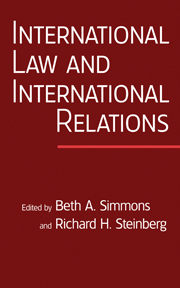Book contents
- Frontmatter
- Contents
- Contributors
- Abstracts
- Preface
- Editors' Note
- PART I INTERNATIONAL REGIMES THEORY: DOES LAW MATTER?
- PART II COMMITMENT AND COMPLIANCE
- PART III LEGALIZATION AND ITS LIMITS
- PART IV INTERNATIONAL LAW AND INTERNATIONAL NORMS
- PART V TREATY DESIGN AND DYNAMICS
- PART VI LAW AND LEGAL INSTITUTIONS
- PART VII OTHER SUBSTANTIVE AREAS OF INTERNATIONAL LAW
- References
- Index
Preface
Published online by Cambridge University Press: 05 June 2012
- Frontmatter
- Contents
- Contributors
- Abstracts
- Preface
- Editors' Note
- PART I INTERNATIONAL REGIMES THEORY: DOES LAW MATTER?
- PART II COMMITMENT AND COMPLIANCE
- PART III LEGALIZATION AND ITS LIMITS
- PART IV INTERNATIONAL LAW AND INTERNATIONAL NORMS
- PART V TREATY DESIGN AND DYNAMICS
- PART VI LAW AND LEGAL INSTITUTIONS
- PART VII OTHER SUBSTANTIVE AREAS OF INTERNATIONAL LAW
- References
- Index
Summary
This volume is intended to help readers understand the relationship between international law and international relations (IL/IR). The excerpted articles, all of which were first published in International Organization, represent some of the most important research since serious social science scholarship began in this area more than twenty years ago. The contributions have been selected to provide readers with a range of theoretical perspectives, concepts, and heuristics that can be used to analyze the relationship between international law and international relations. These articles also cover some of the main topics of international affairs. In this brief preface, we note the rise of law in interstate relations and flag some of the most important theoretical approaches to understanding this development. We also introduce the topics chosen and discuss the volume's organization.
THE RISE OF LAW IN INTERNATIONAL RELATIONS
The study of international law has enjoyed something of a renaissance in the last two decades. Of course, international affairs have long been assumed to include international legal issues. Yet, in the first third of the twentieth century, analysts did not sharply distinguish “international law” from “international relations.” International relations courses were often about international law and frequently confounded the prescripts of international law with the way states were said to behave in fact. By the time the United States entered the Second World War, that illusory mistake was exposed: it was clear that international legal rules and processes had not operated the way many had hoped.
- Type
- Chapter
- Information
- International Law and International RelationsAn International Organization Reader, pp. xxix - xxxviPublisher: Cambridge University PressPrint publication year: 2007

